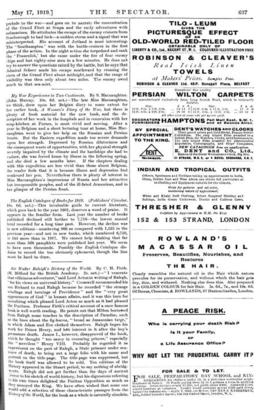Sir Walter Raleigh's History of the World. By C. H.
Firth. (H. Milford for the British Academy. 2s. net.)—" I venerate that villainous adventurer," said Lord Acton in writing of Ralegh, "for his views on universal history." Cromwell recommended his mn Richard to read Ralegh because he recorded "the strange windings and turnings of Providence" and the "very great appearances of God" in human affairs, and it was this turn for moralizing which pleased Lord Acton as much as it had pleased the Puritans. Professor Firth's critical account of a once famous book is well worth reading. He points out that Milton borrowed from Ralegh some touches in the description of Paradise, such as the lines about the fig-leave., "broad as Amazonian targe," in which Adam and Eve clothed themselves. Ralegh began his work for Prints Henry, and lofit interest in it after the boy's premature death. James L, however, disapproved of the book, Which he thought "too saucy in censuring princes," especially the " merciless " Henry VIII. Probably he regarded it as impertinent on the part of Ralegh, a State prisoner under Ben- truce of death, to bring out a large folio with his name and Portrait on the title-page. The title-page was suppressed, but the book itself was allowed to be sold.. Ten editions of the History appeared in the Stuart period, to say nothing of abridg- !mats. Ralegh did not get further than the days of ancient .ireece in his sketch of world-history, but his digressions referring ID his own times delighted the Puritan Opposition as much as they annoyed the King. We have often wished that some one would edit a selection of these characteristic passages from the Ilistory of the World, for the book as a whole is naturally obsolete.


































 Previous page
Previous page